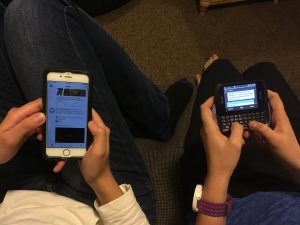
People walk around with smart phones constantly in front of them, scrolling through social media, texting and taking pictures. While this may seem like the new norm, not so long ago cell phones were new and capable of only texts and calls.
A 2017 study done by the Pew Research Center said 92 percent of Americans between the ages of 18 and 29 have smartphones, leaving 8 percent with push-button phones. Nov. 18 is push-button phone day because the first phones with buttons were introduced in stores to replace rotary phones on Nov. 18, 1963.
Although much of society has moved on from push-button phones to smart phones, BYU senior Selah Draper said the old push-button phones still have value.
There are some problems from sticking with a push-button phone when most people have a smart phone, according to Draper. For example, people assume others have access to the internet and social media.
Draper said she reluctantly switched from her push-button phone to a smart phone just one year ago.
“When I didn’t have a smartphone I would go to class and the professors would say ‘now bring out your smartphones and look this up’ and I couldn’t do it, so I had to look over someone’s shoulder,” Draper said.
There are often booths on campus where students will be asked to ‘like’ or ‘share’ something on social media in order to get a reward — something that can be difficult for students without a smart phone.
Rachel Schmidt, a BYU freshman who has a push-button cell phone, said sometimes she will go find a place to sit so she can pull out her laptop and ‘like’ the page on Facebook, her only form of social media. The process keeps her from participating some of the time, she said, but if the incentive is good enough she said the extra two minutes are worth it.
Schmidt’s phone also can’t receive pictures through texts, which she said she sometimes has to explain to people.
Despite the struggles, there are also benefits to having a simpler push-button phone, according to Draper.
With a phone that can’t support many apps, there are less distractions from social media. Draper said before she had a smart phone she checked social media about once a week, but now she frequently checks her accounts.
“It becomes a habit with a smart phone to check, but when you don’t have that thing constantly reminding you to check, then you don’t,” Draper said, “I got a lot more done when I didn’t have a smart phone.”
Bryce LeFevre has a smartphone and is grateful for the technology, but he said he doesn’t like the feeling he should check his phone every two seconds. LeFevre said he remembers interacting more with others more before he had his smartphone.
“I did have a lot more interaction with others (before). You don’t have anywhere to look, so you look up — you say “hi.” Now you look at your phone,” LeFevre said.
There are also other basic benefits from having a ‘dumb phone.’ Not only are they cheaper, Draper said, they are a lot harder to break and can hold a charge for longer.
Draper said her old phone was indestructible and she never had to worry about it breaking, and she was hesitant to get a smartphone because she had dropped her old phone frequently.
Schmidt said her phone is the same one she got in 7th grade, and it hasn’t broken yet.
“I definitely miss my dumb phone, I mean, it’s really convenient with a smart phone, but it’s not the same,” Draper said. “You see people walk down the streets and everyone’s on their phone. I’ve become one of them.”




